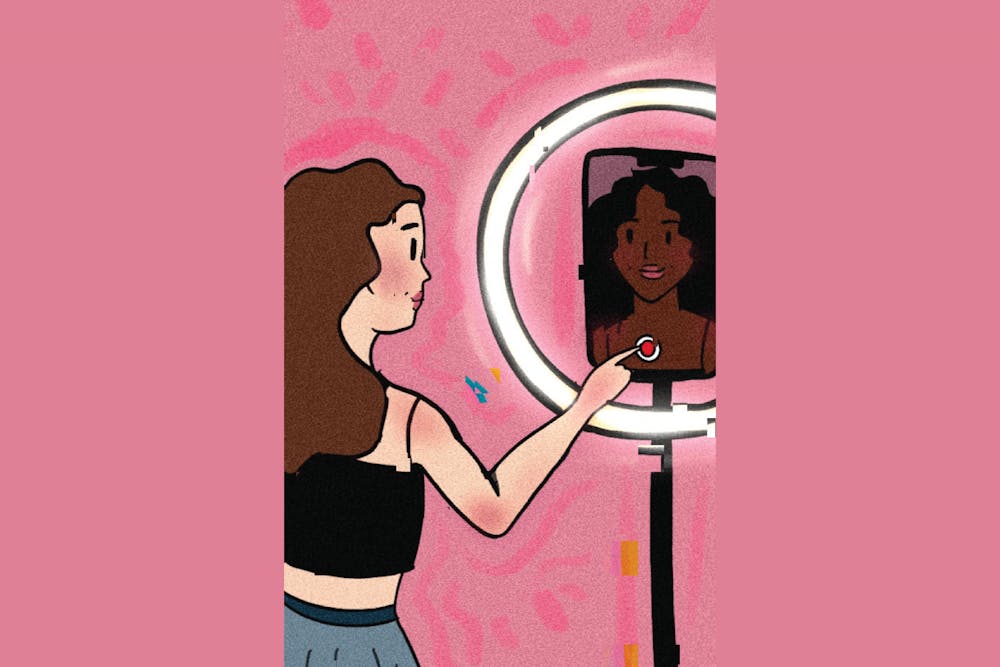If you haven’t heard it already, the viral TikTok sound of influencer Ari Fletcher saying “When it comes to a drink, I’mma have it” has become a staple of many users’ For You pages. Ari Fletcher is a Black woman, but many of the people who have used the audio are white—using the audio as a way to mimic stereotypically Black expressions. In an Oct. 7 video, TikTok user @tylamadeit called attention to the imitation of Black women through this TikTok audio by creating her own version of the sound—but this time, without the emphatic pronunciation that prompted non–Black people’s exaggerated imitations. “Let’s just stay in our lanes from here on out,” her caption reads. “You’re welcome.”
Online, Black women are seen as non–Black people’s alter–egos—these personas can be loud, they can be sassy, and most often, they are exaggeratedly funny. Stereotypical Black female expressions—the neck roll, snapping fingers, teeth sucking—are portrayed as part of a comedic performance, as a caricature. In order to be funny online, you can just be Black—or at least what the stereotyped image of Blackness is.
Popular representations of Black women paint them as aggressive, loud, and audacious— think of Tyler Perry’s Madea or even widely–quoted and memed reality TV star Tiffany “New York” Pollard. It’s fair to note that some Black women are genuinely like these stereotyped representations, and that’s okay. But nevertheless, this facet of Black womanhood shouldn’t be an act imitated by and profited off of by others who aren’t Black women.
When Black feminist writer and scholar Lauren Michelle Jackson first popularized the term “digital blackface” in 2017, she discussed the concept in the context of reaction gifs and memes of Black women. According to Jackson, digital blackface allows non–Black people to replicate and imitate Blackness without engaging in the more explicit forms of minstrelsy, such as literal Blackface. Digitally, non–Black people can employ AAVE (African–American Vernacular English) and Black profile pictures to take on a sassy Black woman as their second personality.
The emergence of TikTok and other video platforms adds another dimension to the conversation on digital Blackface—sound. Now, instead of simply typing AAVE, non–Black people can use sounds made by Black women to mimic them on TikTok. Some of the most popular sounds at the moment are audios of Black women, from those created by rapper Nicki Minaj to those made by controversial internet sensation Peaches.
The problem isn’t necessarily with the usage of the audio itself. It’s with the way non–Black people act while using an audio made by a Black woman. If you don’t use those mannerisms when you normally speak, why use them now?
Cienna Davis, a second year doctoral student at The Annenberg School for Communication studying the role of the internet in processes of racial identity formation and racial justice activism, believes that digital platforms play an especially important role in facilitating this mimicry.
“TikTok has a rhetoric that anyone can become viral—this promise of an egalitarian digital space,” Davis says. “The use of the voice, the mimicry of Black female affective gestures and movement can be extracted and there’s new kinds of values that come with that when it’s placed on a white body. The platform facilitates and rewards that in a way that’s very tangible, in views and follows.”
Though these digital platforms are new, the mimicry of Black women as a form of entertainment has a very long history. Davis notes that Blackface minstrelsy was one of the earliest forms of performance that was created in the United States. People online might not be painting their faces Black to make their intentions explicit, but mimicking Black women serves the same purpose as these early minstrel performances—to capitalize off of stereotypes of Black people and their expressions.
TikTok’s highest paid and most visible creators are overwhelmingly white, even though Black people’s voices and dance challenges create a lot of the content on the platform. Though non–Black people can profit off performing Blackness online, Black women themselves are being criticized for the emotions, expressions, and behaviors that make others viral. “Even if it’s not financial profit, [white creators] still benefit from the social capital of Black coolness,” Davis says.
The normalized mimicry of Black women also has real–life consequences. These stereotypes—for example, the over–sexualized Jezebel—inform how people think of Black women as a whole. The adultification and over–sexualization of Black women through the Jezebel trope contributes to the fact that Black women face higher rates of sexual violence. Racialized stereotypes portray Black women as sexual objects instead of as people, and problematic TikTok audios and trends play a role in that objectification.
Stereotypes of Black women are not harmless jokes—they have been used as justification to harm Black women for centuries. When you post online, think of the person you’re portraying. Is it your authentic self, or are you using a Black woman’s emotions or expressions for comedic effect? Instead of contributing to the not–so–subtle misogynoir on TikTok, take the time to listen to the Black women who are explaining how this mimicry harms them. The next time you scroll through TikTok and hear the many popular audios of Black women, don’t forget the racial and gendered politics embedded into the fabric of social media.







